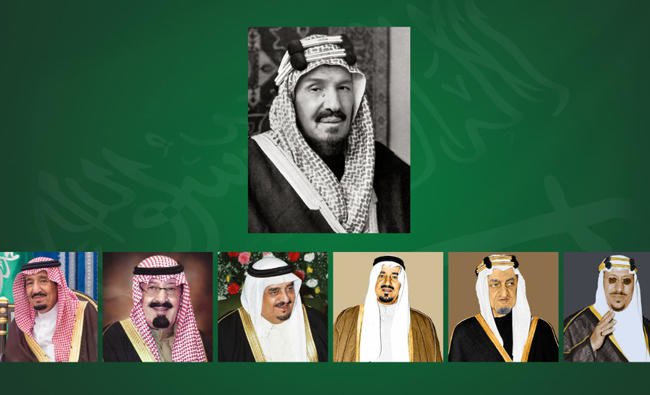
King Salman lends new dimension to unification
Saudi Arabia’s National Day, celebrated every year on Sept. 23, has come a long way in broadening the concept of unification over the years.
The vision and the mission, as well as the enthusiasm for building the Saudi nation shown by the late King Abdul Aziz bin Abdul Rahman Al-Saud were not lost on the successive rulers in the House of Saud. It was the late King Abdullah who fine-tuned the definition of unification as an operating philosophy.
Now, that philosophy serves as inspiration for King Salman, who took charge as the seventh king of Saudi Arabia more than two years ago. King Salman is the man for difficult missions with distinguished leadership qualities. He has established strong relations with world leaders, and worked closely with all previous kings, say Saudi authors and researchers well versed in the king’s life and history.
King Salman, of late, has emerged as a towering personality fighting for peace in the Middle East, fighting to curb the menace of terrorism, leading an economic renaissance in the form of Vision 2030 and infusing new blood into the line of succession by appointing Prince Mohammed bin Salman as crown prince. The Kingdom, under the leadership of King Salman, ranks as a powerful leader of the Muslim world.
“The Kingdom has made great strides in protecting Muslim holy sites from terror attacks. The arms of terrorism have sought to harm the holy sites without any consideration to their sanctities,” King Salman said during a reception in Makkah for dignitaries attending the annual Hajj pilgrimage this year. These words speak about the unparalleled love and respect which the king has for the Two Holy Mosques.
Not only this, the Kingdom is deriving benefits from the long experience of King Salman, who has had the distinction of working with the six previous kings, which enabled him to achieve a lot of political, economic and administrative experience. “Saudi Arabia has now a king, who brings together administrative expertise with a deep knowledge about world affairs and strong leadership qualities,” said Abdul Rahman Al-Shubaili, a Saudi researcher and journalist, in a recently published report.
“When he took over as governor, Riyadh was a small principality covering a few hundred kilometers and when he handed it over to his successor (the late Prince Sattam), the region had expanded at least 10 times, while its population rose from 100,000 to 5 million,” Al-Shubaili pointed out. Salman presided over the Riyadh Development Authority for nearly half a century, and during that period, the region experienced tremendous progress in various sectors, including health, education, industry and culture.
According to a study published by the Ministry of Culture and Information, King Salman, the son of the late King Abdul Aziz, is known for his wisdom and discipline in public life. King Salman’s father used to assign him important national and international missions. “As a result, the then Prince Salman obtained the title, ‘the man for difficult missions.’” Speaking about his leadership qualities, the study said: “He is distinguished for his qualities like determination, discernment, sagacity, intelligence and decision-making powers, which are outstanding qualities he inherited from his father.”
Like his father, Crown Prince Mohammed bin Salman emerged as one of the Kingdom’s most powerful leaders. He advocates for a forceful Saudi foreign policy and is also leading a massive overhaul of the Saudi economy and society. Crown Prince Mohammed, like King Salman, has inherited the qualities of the late King Abdul Aziz, who was well-versed in diplomacy with an intimate knowledge about the affairs of the world.
To this end, it is important to mention the life and achievements of late King Abdul Aziz. How did King Abdul Aziz, the founder of the Kingdom of Saudi Arabia, appear in the eyes of the world? What were the impressions of the international celebrities about him as a leader and as an individual? These have been summed up in an Arabic publication, “King Abdul Aziz as the World Saw Him,” by Said A. Al-Harthi, associate professor of mass communications at King Saud University.
This book is not only the first of its kind, but also presents the founder of the Kingdom of Saudi Arabia in a new light. Through its 600 pages spread over nine chapters, the late King Abdul Aziz Al-Saud comes across as a far-sighted leader whose political insight into Arab and international affairs impressed those who came in contact with him.
Among the first to meet King Abdul Aziz from the Western world was President Franklin D. Roosevelt of the US. His historic handshake with the King aboard the “USS Quincy” in the Suez Canal on Feburary 14, 1945 at 11 a.m. laid the foundation for Saudi-US relations, which have endured the stress and strains of time over the decades.
“Of all persons I have met in life,” said Roosevelt about King Abdul Aziz, “it was the will and determination of the Arab king who gave the maximum for the cause of his country”— and Roosevelt should know, since their meeting came at a time when Saudi Arabia was going through a process of unification of the myriad of sheikhdoms.
Besides the US, Britain was another Western country which had early contact with Saudi Arabia. Lawrence of Arabia and St. John Philby have recorded their impressions of the life and times under Abdul Aziz and his great personality that welded disparate principalities into a monolithic state based on Islamic Sharia.
It is no wonder he was beginning to exercise a magnetic pull on leaders from the East and the West. “I had a strong desire to meet with King Abdul Aziz,” Al-Harthi quotes Winston Churchill as saying. “I was honored to lunch with His Majesty at the Oberoi Hotel in Fayoum where I expressed to him the gratitude of the British government for his friendship with our country and our common causes. He was a man who prevailed over the darkest moments and most serious dangers.”
Though transportation was a major hurdle during the beginning of King Abdul Aziz’s reign, the intrepid editor-in-chief of “Life” magazine, Noel F. Bush, was not daunted by such a challenge, so he visited Saudi Arabia in May 1943 and traveled from Riyadh to Jeddah by car in the company of the Saudi monarch. From his ringside seat, Bush was able to observe King Abdul Aziz. His travelogue chronicles the honesty and integrity of the king, his sense of commitment to the country, his courage and determination and, above all, his sense of history which enabled him to view things in their perspective.
Among the British officials who came in close contact with the Saudi leader, was Alexander Parl. He wrote: “Bin Saud is today most feared by foreign nations dominating the Near East. A dispute with him would only shroud the political atmosphere with darkness.”
Parker Hart, former US undersecretary of state and the first US consul in Dhahran, recorded his impression of King Abdul Aziz. “You sit with King Abdul Aziz and he speaks to you like an affectionate father does. I can say that Abdul Aziz was a wise person who knew where the interests of his country lay and did not hesitate to express his opinion.”
























